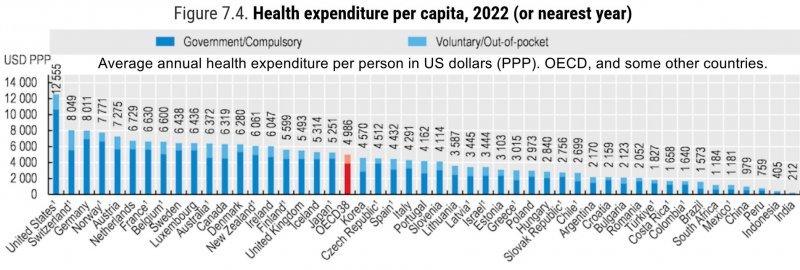Where would the dollars come from to power the non-profit healthcare system?
Higher taxes is the only place it could come from.
That's right, higher taxes
replace the money spent on health insurance premiums.
However, this also means that all the funding for the Public Health Service would be centralised. With a centralised system, the organisation responsible for purchasing drugs and equipment for hospitals would have enormous bargaining power to negotiate prices. As a result, prices could be controlled and reduced, rather than being dictated by pharmaceutical companies and healthcare equipment manufacturers, who often seem to set extortionate rates where there is no bargaining.
But I can’t see that happening in the US. It seems to me that the health insurance industry is too large and entrenched to be dismantled. Such a shift would likely be a political nightmare. The US might be stuck with high insurance premiums to pay for health care -- for the rest of eternity.
Below are graphed statistics (around 2022) from the World Health Organisation. Other statistics I've seen from other sources are very similar. As an
average per capita, $12,555 dollars is spent on health care per person in the US. Compare that to the UK at $5,493. (the average for all nations listed below is $4,986).
Switzerland, the second nation listed from the left, is one of the most expensive nations to live in and visit. They managed to get away with $8,049. Switzerland doesn't have a health system funded through taxes as such. Instead, they have Mandatory Insurance, where every resident in Switzerland is required by law to have health insurance. The basic plan being regulated by the government. Some however are covered and paid for through taxes -- subsidies for those who cannot afford premiums. And yet the total average expenditure for Switzerland is significantly lower than the US.
I don't think the average American is so unhealthy as to warrant an
average of $12,555. Its said that the Swiss system is often praised for its high quality care and universal coverage but criticized for its high costs, with residents paying some of the highest health insurance premiums in the world. Yet their average expenditure per person is still significantly less than the US.
Where might the rest of the money in the US system be going to? Who's pockets is it lining? Who is campaigning or lobbying to maintain the status quo?



